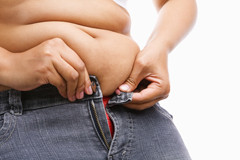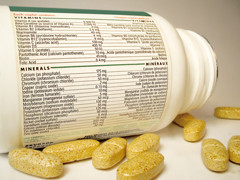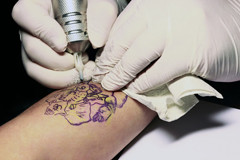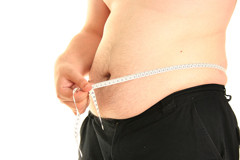
What are somatic workouts?

How to curb your stress eating

How to spot Parkinson’s disease symptoms

8 simple ways to reduce ultra-processed foods in your diet

Heart failure symptoms in women: How they’re different

GERD diet: Foods to avoid to reduce acid reflux

Strong is the new skinny

Everyday habits that sneakily weaken your bones

Don’t wait to get help for back pain

Correcting how you walk may ease osteoarthritis knee pain
Harvard Health Blog
Read posts from experts at Harvard Health Publishing covering a variety of health topics and perspectives on medical news.
Articles
Simple blood test helps bring celiac disease out of the shadows
What happens when the body rejects a protein found in many foods? Ask anyone with celiac disease. This increasingly common condition—it’s grown four-fold since the 1950s—causes a host of aggravating and potentially disabling symptoms such as gas, bloating, diarrhea, cramps, fatigue, weight loss, and more. But it’s also a trickster, causing subtle changes that may not be identified as stemming from celiac disease, like iron-deficiency anemia, low vitamin D, or a suspicious broken bone in an otherwise healthy person. People with celiac disease can’t tolerate gluten, a protein found in wheat, barley, and rye, even in small amounts. It once took an average of 10 years to diagnose celiac disease. Today it can happen faster, thanks to a simple blood test that detects anti-gluten antibodies.
Is retirement good for health or bad for it?
For many people, retirement is a key reward for decades of daily work—a time to relax, explore, and have fun unburdened by the daily grind. For others, though, retirement is a frustrating period marked by declining health and increasing limitations. For years, researchers have been trying to figure out whether the act of retiring is good for health, bad for it, or neutral. Researchers at the Harvard School of Public Health looked at rates of heart attack and stroke among men and women in the ongoing U.S. Health and Retirement Study. Those who had retired were 40% more likely to have had a heart attack or stroke than those who were still working. The increase was more pronounced during the first year after retirement, and leveled off after that. The results, reported in the journal Social Science & Medicine, are in line with earlier studies that have shown that retirement is associated with a decline in health. But others have shown that retirement is associated with improvements in health, while some have shown it has little effect on health.
Fear of breast cancer recurrence prompting women to choose prophylactic mastectomy
Living through the physical and emotional toll of breast cancer is so traumatic that some women can’t bear the thought of doing it again. That’s why a growing number of women who have already been diagnosed with cancer in one breast are taking the drastic measure of having both breasts removed (a procedure called prophylactic mastectomy). Yet a University of Michigan study presented last week at the American Society of Clinical Oncology’s Quality Care Symposium showed that nearly three-quarters of women who had this procedure were actually at very low risk of developing cancer in the healthy breast. In other words, many women are unnecessarily exposing themselves to the potential risks of a double mastectomy—including pain, infection, and scarring. The new study suggests that more and better information about breast cancer recurrence—and the risks and benefits of prophylactic mastectomy—are needed as women consider this procedure.
Recipe for health: cheap, nutritious beans
Beans, the butt of countless flatulence jokes, are often written off as food for poor people, or cheap substitutes for meat. Given what beans can do for health, they should be seen as food fit for royalty—or at least for anyone wanting to get healthy or stay that way. The beans described here are what botanists call legumes, and others call “pulses.” They include black beans, black-eyed peas, garbanzo beans (also called chickpeas), lentils, peanuts, soybeans, and others. Legumes are an excellent source of protein and fiber. They are low in fat. They are also nutrient dense, meaning they deliver plenty of vitamins, minerals, and other healthful nutrients relative to calories. An article in the current Archives of Internal Medicine showed that adding more beans to the diet can help people with diabetes lower their blood sugar. These findings are in line with a growing body of evidence on the health benefits of eating beans. They’ve been linked to reduced risk for heart disease, type 2 diabetes, and colon and other cancers, as well as improved weight control.
Remembering Dr. Joseph Murray, a surgeon who changed the world of medicine
On Monday, Dr. Joseph E. Murray passed away at age 93. A long-time member of the Harvard Medical School faculty, Murray pioneered the field of organ transplantation. This great achievement, for which he was honored with the Nobel Prize in Medicine in 1990, has given the gift of life to hundreds of thousands of people destined to die young. But his success did not come easily. Not only did Murray attempt to do something others judged impossible, but kept trying in the face of sometimes withering criticism from peers. Murray’s team successfully performed the first organ transplant, a kidney donation from one young man to his twin brother. Over the next decade, Murray and his colleagues learned how to quiet the immune system to make it possible to transplant organs between unrelated people.
In praise of gratitude
The Thanksgiving holiday began, as its name implies, when the colonists gave thanks for surviving their first year in the New World and for a good harvest. Nearly 400 years later, we’re learning that the simple act of giving thanks is not just good for the community but may also be good for the brain and body. Gratitude helps people refocus on what they have instead of what they lack. By acknowledging the goodness in their lives, expressing gratitude often helps people recognize that the source of that goodness lies at least partially outside themselves. This can connect them to something larger—other people, nature, or a higher power. In the relatively new field of positive psychology research, gratitude is strongly and consistently linked to greater happiness. Although some people may be born with a gift for expressing gratitude, anyone can learn how to do it. And this mental state grows stronger with use and practice. Here are some ways to cultivate gratitude.
Turkey: a healthy base of holiday meals
Done just right, Thanksgiving dinner can be good for the heart. The bird at the center of the feast was once in line to be our country’s mascot. Benjamin Franklin and other turkey aficionados thought of this fowl as wild, wary to the point of genius, and courageous. When cooked, it has another excellent quality—turkey meat is much easier on the heart than many other holiday main courses. Other mainstays of traditional Thanksgiving feasts, like cranberries, sweet potatoes, pumpkin, and pecans, are healthy on their own, but tend to lose their virtue by the company they keep (butter, brown sugar, whipped cream, marshmallows, and more). If you’re set on a traditional dinner, alternative recipes abound for healthier stuffing, vegetables, and desserts. You can also start your own traditions. After all, today’s Thanksgiving dinner bears little resemblance to the original feast.
Doctors aren’t immune to addiction
It’s easy to think of doctors as paragons of the health and wellness they try to restore in their patients or help them maintain. Some are, and some definitely aren’t. One in 10 physicians develop problems with alcohol or drugs at some point during their careers. Those who admit they have an addiction to alcohol or drugs, as well as those who slip up and get reported, usually have to go through an intense substance abuse program before they can practice medicine again. Such physician health programs are pretty effective, helping around 80% of doctors recover from their problems. But these programs raise some ethical questions, according to Harvard Medical School’s J. Wesley Boyd and John R. Knight, who wrote a review of physician health programs in the Journal of Addiction Medicine. They should know, having spent a total of 20-plus years as associate directors physician health programs.
Losing weight and belly fat improves sleep
Do you have trouble sleeping? If you’re carrying extra pounds, especially around your belly, losing weight and some of that muffin top may help you get better ZZZs. So say researchers from Johns Hopkins University School of Medicine, who presented their findings at this year’s annual meeting of the American Heart Association. In a six-month trial that included 77 overweight volunteers, weight loss through diet plus exercise or diet alone improved sleep. A reduction in belly fat was the best predictor of improved sleep. Among people who are overweight, weight loss can reduce sleep apnea, a nighttime breathing problem that leads to frequent awakenings. Exercise has also been shown to improve sleep quality. Despite what thousands of websites want you to believe, there are no exercises or potions that “melt away” belly fat. Instead, the solution is old-fashioned exercise and a healthy diet.
Mental strain helps maintain a healthy brain
When it comes to keeping healthy and fit, living a mentally active life is as important as regular physical exercise. Just as your muscles grow stronger with use, mental exercise keeps your mental skills and memory in tone. Although any brain exercise is better than being a total mental couch potato, some kinds of “brain work” are more effective than others. The activities with the most impact are those that require you to work beyond what is easy and comfortable. Try these four basic brain-health strategies: Be a lifelong learner. Strain your brain with mentally challenging tasks. Get out of your comfort zone from time to time to challenge your mental skills. Be social. And don’t forget your body—physical activity that gets your pulse thumping helps the mind as well as the heart.
Zombie apocalypse? Only in your dreams
It’s Halloween—a time when we’re preoccupied with witches, ghouls, and other frightful creatures. But this year, no creature is generating as much buzz as the zombie. Zombies have inspired movies and TV shows, video games—even a bloody Pride and Prejudice takeoff. Could all this talk of the undead be foreshadowing a real-life zombie apocalypse? In fiction, yes. But not in real life. A Harvard ethnobotanist once found that a neurotoxin was the cause of several cases of zombie-like living deaths in Haiti. Oddly shaped proteins called prions have also been linked to brain diseases that vaguely resemble zombieism. In his novel The Zombie Autopsies, Dr. Steven Schlozman, a zombie enthusiast and professor of psychiatry at Harvard Medical School, imagined an infection scenario that turns normal human beings into flesh-craving monsters. Although a pandemic that creates zombie-like symptoms is theoretically possible, a real-life zombie apocalypse shouldn’t be high up on our list of worries.
World Stroke Day: Emphasize prevention, early detection
The term “stroke” conjures up a frightening bolt out of the blue. It certainly feels that way when it happens. But the sudden onset hides most strokes’ decades-long development stemming from slow but steady damage to blood vessels, the growth of artery-clogging plaque, or the erratic heart rhythm known as atrial fibrillation. This long gestation means it is often possible to avoid a stroke by fighting arterial corrosion. Today is World Stroke Day—a moment to pay close attention to stroke. Worldwide, this brain-damaging condition afflicts millions of people each year, and kills more than 6 million. In the United States, about 800,000 people have strokes each year, and about 140,000 die from them. There are two main messages of World Stroke Day: Stroke can be prevented. Stroke can be treated if detection and treatment happen quickly.
Metacognitive therapy: a possible new approach for ADHD?
One treatment that can help relieve depression and other mental or emotional problems is cognitive behavioral therapy. It guides individuals to change what they think. A related approach, called metacognitive therapy, helps individuals change how they think. Some preliminary but promising research suggests that metacognitive therapy may be useful for people with attention deficit hyperactivity disorder (ADHD). One study of 88 adults with ADHD found that metacognitive therapy led to significant reduction in ADHD symptoms in 42% of participants, compared to 12% who received supportive therapy. Keep in mind that metacognitive therapy is not yet a proven therapy. More research is needed on its effectiveness in different settings. But that means it doesn’t yet stack up to its elder cousin, cognitive behavioral therapy. And metacognitive therapy can’t be considered as a first line treatment for ADHD.
Puberty starts earlier in many American boys
Two years ago, new research showed that American girls were hitting puberty at younger ages than ever. The same thing is happening with boys: they are starting puberty almost two years earlier than they did 30 to 40 years ago. Why this is happening isn’t clear, but it could affect social and sexual behaviors. A new study shows that the average age of puberty is now 10 years for white boys (about one-and-a-half years earlier than what has long been considered “normal”), 9 years for African-American boys (about two years earlier than expected), and 10 years for Hispanic boys, which is unchanged from before. Although early puberty is increasingly common, it can be a signal of a tumor in the brain, pituitary glands, or elsewhere; an underactive thyroid gland; or other medical problems.
Daily multivitamin-multimineral may help protect against cancer
Americans’ love affair with vitamins—more than half of us take one a day—isn’t well supported by science. Trials of single vitamins, like E, C, and beta carotene, have been a bust. Whether multivitamins offer any health benefits has been something of a mystery. Now a new report indicates that taking a standard multivitamin-multimineral pill every day for more than a decade reduces the odds of developing cancer by 8%. The finding comes from the Physicians’ Health Study II, a Harvard-based trial in which nearly 15,000 male physicians took a daily pill containing 31 vitamins and minerals (Centrum Silver) or a placebo. The reduction could be due to fixing micronutrient deficiencies. It’s also possible that low doses of several vitamins and minerals might work together in other ways to prevent cancer. A daily multivitamin-multimineral supplement can provide some nutritional insurance, but it’s no replacement for vegetables, fruits, whole grains, and other healthful foods.
4 tips for preventing neck strain when using a tablet computer
For all too many people, using a tablet computer is a pain in the neck, shoulders, and back. Why? Widely popular tablets like the iPad, Nook, Kindle Fire, and Xoom are so light and easy to handle that you can hold one on your lap or in your hand. That can put you in a position that’s bad for your neck, shoulders, and back. In a study of 15 experienced tablet users, Harvard School of Public Health researchers found that working with a tablet held on the lap or placed flat on a table makes the neck bend much more than does working with a desktop or notebook computer. Neck-wise, the best tablet orientation was having it propped up on a table. Next time you expect to be working with a tablet computer for more than a few minutes, place it on a table and use a case that holds it at a comfortable viewing angle. Shift your hands, your weight, or even stand up when you can. And take a break every 15 minutes.
Lycopene-rich tomatoes linked to lower stroke risk
Succulent tomatoes are far more than just a delicious fruit. Eating them may also help lower your risk of stroke, likely due to the lycopene they contain. Lycopene is a powerful antioxidant that eliminates dangerous free radicals that can damage DNA and other fragile cell structures. Past research has shown that a diet rich in lycopene-containing foods may help lower the risk of prostate and other cancers. Now, in a report just published in the journal Neurology, a team of Finnish researchers has linked higher lycopene levels in the blood to protection against stroke. The researchers suggested that lycopene, in addition to its ability to attack free radicals, may also reduce inflammation and cholesterol, improve immune function, and prevent blood from clotting. All of these may help reduce ischemic strokes, which are caused by clot-caused blockages in blood flow to the brain. It’s best to get lycopene from food—tomatoes and watermelon are excellent sources—not supplements.

What are somatic workouts?

How to curb your stress eating

How to spot Parkinson’s disease symptoms

8 simple ways to reduce ultra-processed foods in your diet

Heart failure symptoms in women: How they’re different

GERD diet: Foods to avoid to reduce acid reflux

Strong is the new skinny

Everyday habits that sneakily weaken your bones

Don’t wait to get help for back pain

Correcting how you walk may ease osteoarthritis knee pain
Free Healthbeat Signup
Get the latest in health news delivered to your inbox!
Sign Up

























